With its public hearings on the sixth day, the International Court of Justice concluded its public proceedings in regard to the legal consequences of Israel’s policies and practices in the Occupied Palestinian Territories including Jerusalem.
The proceedings had been demanded End of 2022 by a resolution from the UN General Assembly.
The court was called to give an advisory opinion, which is non-binding.
On the last day, Türkiye, Zambia, Spain, Fiji and the Maldives held their oral presentations, in addition to their written statements. Besides, three multilateral organizations, The Organization of Islamic Cooperation, the Arab League of States and the African Union made a statement in the court.
The sessions have now concluded, and the court retreated for deliberation. There is no certain time limit to prepare the opinion, with some experts expecting it before the year.
In today’s hearing, Zambia and Fiji resembled earlier arguments of the United States and United Kingdom, calling the court to decline providing the opinion.
Türkiye, Spain, the Maldives meanwhile condemned Israel’s occupation and demanded an end to the impunity the country enjoys before the international law.
Here are the summaries of the presentations made today.
Türkiye: Palestinian conflicts bears “risk for regional and global peace and security”
On behalf of Türkiye spoke Ahmet Yıldız, Deputy Minister for Foreign Affairs.
Yıldız began by detecting that the “injustices inflicted on the Palestinian people” had brought “the rules-based international system to a point of collapse”. The Turkish representative warned the crisis in Gaza and the West Bank runs, “if left unchecked, the risk of threatening not only regional but also global peace and security”.
“The current trajectory risks a broader regional conflagration as well as inter-communal polarization”, sad Yılmaz, pointing to rising risks of Islamophobia, Antisemitism and extremism all around the world.
The Turkish Deputy Foreign Minister criticized the “lack of political will or interest among the international community” and underlined the several UN General Assembly and Security Council resolutions that were not implemented.
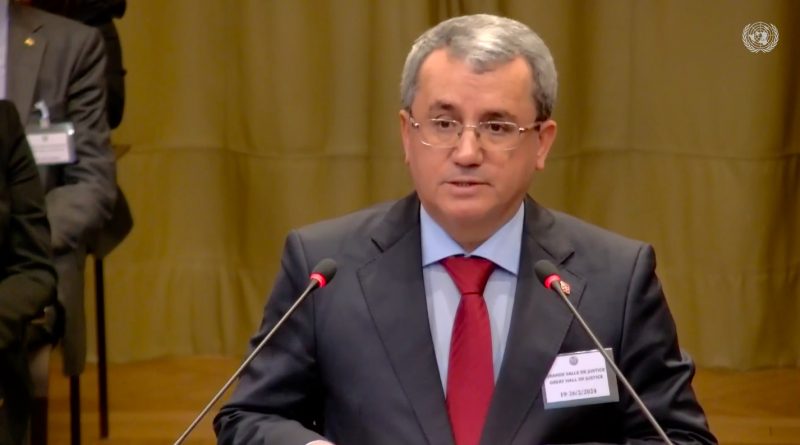
“Palestinians only want justice, equality, dignity, and their long-deserved independence”, said Yıldız, emphasizing the Türkiye had always sided with the oppressed and welcomed also Jews when these were “oppressed centuries ago in Europe and during the Second World War”.
Today, said Yıldız, are Palestinians subject to “practices from the Middle Ages and sometimes even worse.”
Yıldız focused in depth about the Al Aqsa Mosque and the holy sites in Jerusalem, rejecting Israel’s attempts to change the historical status quo.
The Turkish representative demanded the full implementation of the provisional measures the court had demanded weeks ago in the case South Africa versus Israel and called upon the court to “declare Israel’s policies and practices in the occupied Palestinian territories including East Jerusalem illegal.”
“The Republic of Türkiye will continue its efforts to contribute to the permanent peace between Israel and Palestine, more urgently for a lasting ceasefire in Gaza and immediate, unhindered flow of humanitarian assistance into Gaza” said Yıldız and added that his country had also developed “the idea of a guarantee mechanism” for future negotiations.
Zambia: A “complex” case – Court should decline to provide an opinion
On behalf of Zambia spoke Marshal Mubambe Muchende, State Counsel and Solicitor-General.
Muchende said the court was facing a “complex question requiring Solomonic wisdom.” He based his arguments on UN Charter, the Statute of International Court of Justice as well as the Oslo Accords between Israel and Palestine.
The Zambian representative called the court to take a “comprehensive and balanced perspective”, emphasized “complexities and nuances” in the circumstances.
Arguing that a “sustainable” two-state solution “cannot be imposed from the outside”, Muchende proposed the parties should find the final determination of their dispute “through a settlement means of their choice, which is negotiations”.
He said, “the court is neither the only dispute resolution mechanism available nor is it the best”. He concluded the court should “rather give deference and sanctity to bilateral agreements between the two states.”
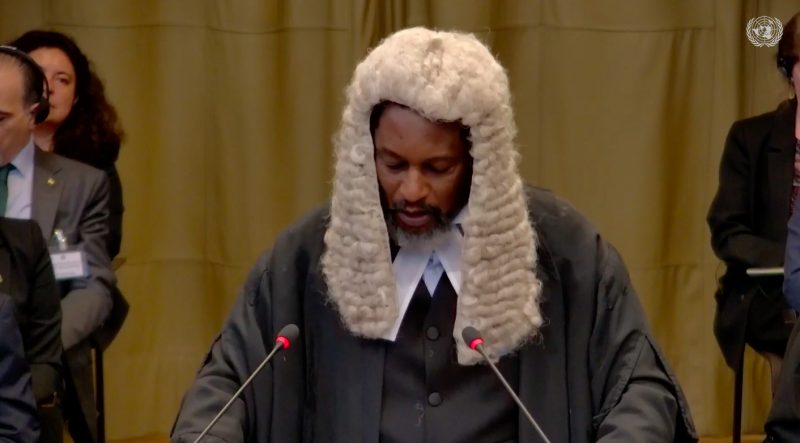
The League of Arab States: “End the last oppressive, expansionist, apartheid, settler, colonial occupation still standing in the 21st century”.
The Arab League was represented by Abdel Hakim El Rifai, Deputy Chief of the Permanent Mission in Brussels and Ralph Wilde, Senior Counsel and Advocate.
El Rifai presented a statement prepared by Ahmed Aboul Gheit, Secretary General of the Arab League of States. The League, wşch has its headquerters in Cairo, Egypt is, comprised of 22 states with a poulation of approximately 460 million.
The League called on the court “to end the last oppressive, expansionist, apartheid, settler, colonial occupation still standing in the 21st century”.
“The persistence of this occupation, acts of genocide, ethnic cleansing, war crimes, crimes against humanity, displacement of populations, imprisonment of Palestinians behind illegal segregation walls, expansion of illegal settlements, creating new political realities on the ground, aiming at complicating the dismantling of the occupation. Ending Israel’s total impunity and subjecting it, like any other state, to the universal rules of international law will help annul its pretexts to systematically reject peace initiatives”, the statement said.
Speaking on the international law dimension of the conflict, the Arab League’s law counsel Wilde demanded “the end of occupation, the immediate removal of settlers, the enabling of Palestinian self-administration.
Organization of Islamic Cooperation (OIC): “Objective third party” necessary for peace
Hissein Brahim Taha, Secretary-General, represented the Organization of Islamic Cooperation. He was assisted by Monique Chemillier-Gendreau, Professor of Public Law and Political Science at the University Paris Diderot and Counsel.
Taha began his presentation emphasizing that the OIC was founded in 1969 in response to an attack on the Al Aqsa Mosque in Jerusalem, with defending the rights of the Palestinian people as being one of its goals stated in its charter.
The OIC is the second largest international organization after the United Nations with a membership of 57 states spread over four continents and an estimated represented population 1.8 billion.
Taha condemned the “war being waged by the Israeli occupier in Gaza”, including “massive war crimes and the risk of genocide”. He denounced an end to occupation and emphasized that “lasting and comprehensive peace is only possible with a two-state solution”.
The Secretary General of the OIC also called other countries to end arms export to Israel and urged the “international community to take immediate and swift measures to end the massacre and targeting of Palestinian civilians”.
As second speaker for the OIC, Chemillier-Gendreau focused on the argument of ongoing negotiations which might be disrupted by an advisory opinion of the court. This argument had been brought forward by the United States and the United Kingdom, among others, with the latter even proposing to the court to decline giving an opinion.
Ongoing negotiations are “a myth artificially maintained”, said Chemillier-Gendreau, arguing that Palestinians would “not recover their legitimate rights by direct bilateral negotiations with Israel”.
Chemillier-Gendreau reasoned they were under military occupation in a “position of structural weakness”. Besides, added the French professor, had Israel always tried to gain concessions from Palestine’s fundamental rights.
Peace from an agreement between the parties will be concluded under the “arbitrary sponsorship of a third state in objectivity”, she concluded.
The African Union (AU): Palestinians suffer “succession of nakbas”
The African Union was represented by Hajer Gueldich, its Legal Counsel, Mohamed Salem Khalil, Senior Legal Officer and Mohamed Helal, Legal Expert.
“The history of Palestine is a history of dispossession, displacement and dehumanization”, said Gueldich, and added that this tragedy was demonstrated once again by the ongoing Israeli aggression against Gaza.
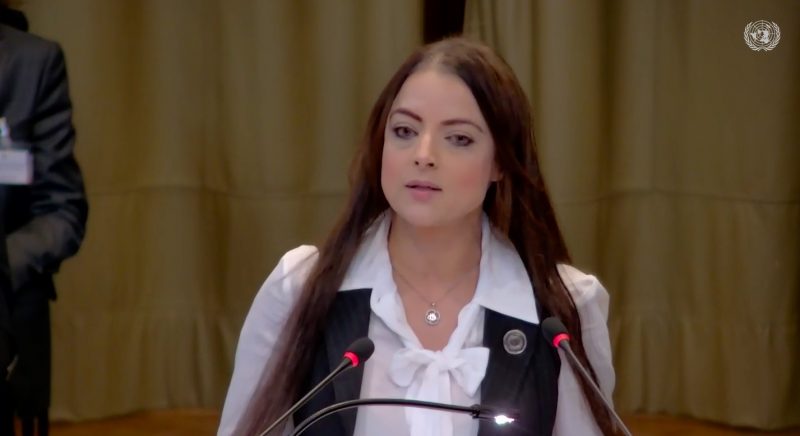
She quoted from the African Union’s statement from February 17, which expressed “total outrage at the humanitarian catastrophe caused by Israeli forces occurring in the Gaza Strip and their full support for the Palestinian people in their legitimate struggle against Israeli occupation”.
The AU is made up of 55 Member States which represent all the countries on the African continent and represents a population is 1.3 billion.
The Palestinian people are “enduring a succession of nakbas from the Balfour Declaration to the wars of 1948, 1956, 1967 and 1982, with the establishment and expansion of Israeli settlements, Gueldich stated.
“This instant advisory proceeding is an opportunity to at last hold Israel accountable for its acts, but also to put an immediate end to its impunity”, the representative from the African Union concluded.
Spain: Establishing embassies in Jerusalem is “threat to peace in the region and the world”
On behalf of Spain spoke Emilio Pin Godos, Deputy Head of the International Legal Office, Ministry of Foreign Affairs and Santiago Ripol Carulla, the Head of the Office.
Godos made an evaluation of international law in regard to the Palestinian conflict and emphasized that, despite its withdrawal 2005, Israel has not terminated the occupation of Gaza. It “has retained effective control over the territory through its control of airspace, space, territorial sea, and external land boundaries”, the Spanish representative said.
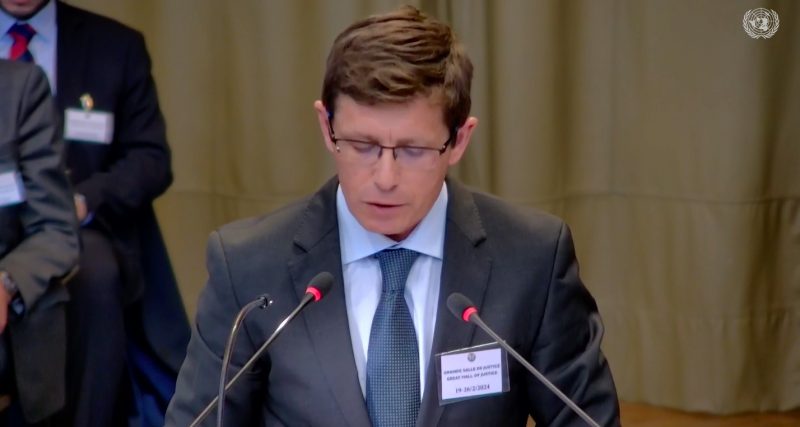
In addition to other international laws, Godos stated that Israel also had violated the International Covenant on Economic, Social and Cultural Rights and the International Covenant on Civil and Political Rights, as well as the United Nations Convention on the Rights of the Child.
Santiago Ripol Carulla, the second Spanish speaker, focused on state responsibility in the context of Palestine.
Stating that UN resolutions and condemnations of had Israel’s policies had lacked to produce sanctions, Carulla proposed what specifically the obligation of states to cooperate against these policies mean.
Remembering that states are called not to take any measures that would recognition of illegal change of status, the Spanish representative “Establishing diplomatic missions in the Holy City is a serious threat to the stability of peace in the region and the world.”
Fiji: Court should decline to give opinion
On behalf of Fiji spoke Filipo Tarakinikini, Permanent Representative to the United Nations.
Tarakinikini began his speech emphasizing the right of Palestinians to self-determination and the “right of the Jewish state of Israel to exist as a sovereign state with secure borders”. The speaker from Fiji positively confirmed what others had criticized: the definition of Israel as a “Jewish state”, although an important part of its citizenship is non-Jewish.
Resembling again other countries’ objection to the court, Tarakinikini also stated that “the only way to achieve truly sustainable peace between Israel and the Palestinian people, indeed between any neighbors, is through mutual respect”.
In that endeavor, he pointed to the existing “legal framework”, namely the among others the Oslo Accords which “requires direct negotiations”. These contain a specific dispute resolution that, said the speaker from Fiji, “do not permit either party unilaterally to commence external legal proceedings”.
Tarakinikini, who had participated personally in peace keeping missions in the Middle East, also criticized the demand of Israel’s “unconditional withdrawal”, saying this would “circumvent the peace process and the agreements” – the United States had argued similarly that the framework was “peace for land”, concluding that from Israeli “giving away land” without “getting peace” was a violation of the process.
Tarakinikini called the court to “exercise its judicial discretion not to render an advisory opinion”, in other words, decline the demand of the General Assembly.
“The court has been presented in the proceedings with a distinctly one-sided narrative, said the representative from Fiji, and claimed regarding fact finding that the court “cannot simply defer to the reports of United Nations bodies”.
He also considered “highly problematic” that the court was asked to argue about the policies of one party to the exclusion of the other.
Fiji thus joined countries such as the United Kingdom that had proposed the court should decline the answer.
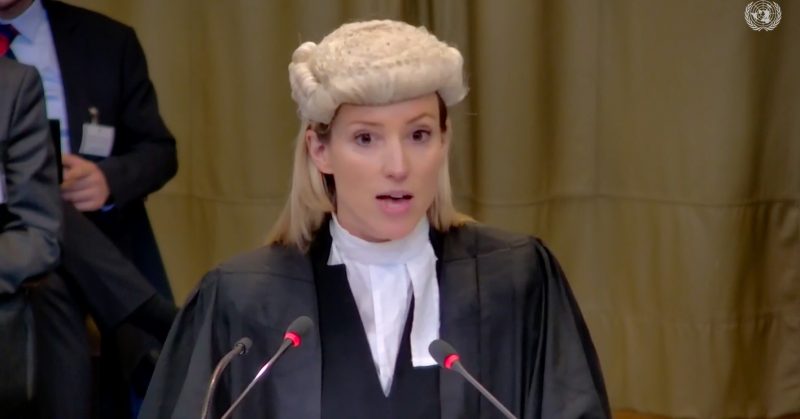
Maldives: Israel deprives of the “right to water”
On behalf of the Maldives spoke Amy Sander, legal counsel.
Sander focused in her analysis Israel’s violation of international laws specifically on the issue of water resources.
“Many Palestinians in the Gaza Strip simply have, I use the court’s own words, no access to potable water”, she said, and added this occurred on a “discriminatory basis”.
In the West Bank, use of vital groundwaters is marred by grossly inequitable allocations between Israelis and Palestinians”, continued Sander and added “Disruption of vital infrastructure, with Israel demolishing sanitation structures and pipelines”.
The Maldives’ representatives also mentioned that Israel’s policies violate international laws regarding public health and hygiene as well as the general right to water.
The systematic discrimination’s “The impact on women and children is notably egregious, with the dearth of clean water, an acute crisis for mothers trying to feed their babies” Sanders said.
She demanded Israel “must dismantle the discriminatory regime concerning water”.

















Leave a Reply